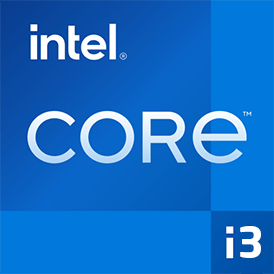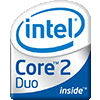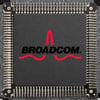
Intel Core i3-530 Benchmark, Test and specs
Last updated:
The Intel Core i3-530 is a 2 core processor. It can handle 4 threads simultaneously and was introduced in Q1/2010. The Intel Core i3-530 is based on the 1. generation of the Intel Core i3 series and requires a mainboard with the socket LGA 1156. The Intel Core i3-530 scores 469 points with one CPU core in the Geekbench 5 benchmark. When using all CPU cores, the result is 1,064 points.

| Name: | Intel Core i3-530 |
|---|---|
| Family: | Intel Core i3 (205) |
| CPU group: | Intel Core i3 500 (4) |
| Architecture: | Clarkdale |
| Segment: | Desktop / Server |
| Generation: | 1 |
| Predecessor: | -- |
| Successor: | -- |
CPU Cores and Base Frequency
The 2 CPU cores of the Intel Core i3-530 clock with 2.93 GHz. The number of CPU cores and the clock frequency of the processor are largely responsible for the overall performance.
| CPU Cores / Threads: | 2 / 4 |
|---|---|
| Core architecture: | normal |
| Cores: | 2x |
| Hyperthreading / SMT: | Yes |
|---|---|
| Overclocking: | No |
| Frequency: | 2.93 GHz |
| Turbo Frequency (1 Core): | -- |
| Turbo Frequency (2 Cores): | -- |
Internal Graphics
With the Intel HD Graphics (Westmere), the Intel Core i3-530 has an build in graphic solution. It has 12 SM processors, which have a total of 24 texture shaders. The iGPU not only enables games, but also significantly accelerates video playback.
| GPU name: | Intel HD Graphics (Westmere) |
|---|---|
| GPU frequency: | 0.50 GHz |
| GPU (Turbo): | 0.73 GHz |
| Compute units: | 12 |
| Shader: | 24 |
| Hardware Raytracing: | No |
| Release date: | Q1/2010 |
| Max. displays: | 2 |
|---|---|
| Generation: | 5 |
| Direct X: | 10.1 |
| Technology: | 32 nm |
| Max. GPU Memory: | 2 GB |
| Frame Generation: | No |
Hardware codec support
Processors that have an integrated graphics can play videos faster and more efficiently. This can have a positive effect on the battery life of notebooks, for example.
| h265 / HEVC (8 bit): | No |
|---|---|
| h265 / HEVC (10 bit): | No |
| h264: | Decode |
| VP8: | No |
| VP9: | No |
| AV1: | No |
|---|---|
| AVC: | Decode |
| VC-1: | No |
| JPEG: | No |
Memory & PCIeThe Intel Core i3-530 supports up to 16 GB memory in up to 2 (Dual Channel) memory channels. This results in a maximum memory bandwidth of 21.3 GB/s. |
|
| Memory type: | Memory bandwidth: |
|---|---|
| DDR3-1066 DDR3-1333 | 17.1 GB/s 21.3 GB/s |
| Max. Memory: | 16 GB |
| Memory channels: | 2 (Dual Channel) |
| ECC: | Yes |
| PCIe: | 2.0 x 16 |
| PCIe Bandwidth: | 8.0 GB/s |
Thermal ManagementWith the TDP, the processor manufacturer specifies the cooling solution required for the processor. The Intel Core i3-530 has a TDP of 73 W. |
|
|---|---|
| TDP (PL1 / PBP): | 73 W |
| TDP (PL2): | -- |
| TDP up: | -- |
| TDP down: | -- |
| Tjunction max.: | -- |
Technical details
The Intel Core i3-530 has a 4.50 MB large cache. The processor is manufactured in 32 nm. Modern production increases the efficiency of the processor.
| Technology: | 32 nm |
|---|---|
| Chip design: | Monolithic |
| Socket: | LGA 1156 |
| L2-Cache: | 0.50 MB |
| L3-Cache: | 4.00 MB |
| AES-NI: | No |
| Operating systems: | Windows 10, Linux |
| Virtualization: | VT-x, VT-x EPT |
|---|---|
| Instruction set (ISA): | x86-64 (64 bit) |
| ISA extensions: | SSE4.1, SSE4.2 |
| Release date: | Q1/2010 |
| Release price: | 117 $ |
| Part Number: | -- |
| Documents: | Technical data sheet |
Rate this processor
Benchmark results

The benchmark results for the Intel Core i3-530 have been carefully checked by us. We only publish benchmark results that have been created by us or that have been submitted by a visitor and then checked by a team member. All results are based on and fullfill our benchmark guidelines.
Screenshots:
Screenshots:
Geekbench 5, 64bit (Single-Core)
Geekbench 5 is a cross plattform benchmark that heavily uses the systems memory. A fast memory will push the result a lot. The single-core test only uses one CPU core, the amount of cores or hyperthreading ability doesn't count.

|
Intel Celeron G1820T
2C 2T @ 2.40 GHz |
||

|
AMD A6-6400K
2C 2T @ 4.10 GHz |
||

|
AMD FX-6100
6C 6T @ 3.90 GHz |
||
|
|
Intel Core i3-530
2C 4T @ 2.93 GHz |
||

|
Intel Core 2 Quad Q9650
4C 4T @ 3.00 GHz |
||

|
Intel Core 2 Quad Q9500
4C 4T @ 2.83 GHz |
||

|
AMD Athlon II X2 265
2C 2T @ 3.30 GHz |
||
Geekbench 5, 64bit (Multi-Core)
Geekbench 5 is a cross plattform benchmark that heavily uses the systems memory. A fast memory will push the result a lot. The multi-core test involves all CPU cores and taks a big advantage of hyperthreading.

|
AMD Athlon II X3 455
3C 3T @ 3.30 GHz |
||

|
Intel Celeron 4305UE
2C 2T @ 2.00 GHz |
||

|
Intel Celeron G1620
2C 2T @ 2.70 GHz |
||
|
|
Intel Core i3-530
2C 4T @ 2.93 GHz |
||

|
AMD A10-8700P
4C 4T @ 3.20 GHz |
||

|
Intel Celeron G1840T
2C 2T @ 2.50 GHz |
||

|
Intel Core i3-3120ME
2C 4T @ 2.40 GHz |
||
Geekbench 6 (Single-Core)
Geekbench 6 is a benchmark for modern computers, notebooks and smartphones. What is new is an optimized utilization of newer CPU architectures, e.g. based on the big.LITTLE concept and combining CPU cores of different sizes. The single-core benchmark only evaluates the performance of the fastest CPU core, the number of CPU cores in a processor is irrelevant here.

|
Intel Core i3-4010Y
2C 4T @ 1.30 GHz |
||

|
Intel Pentium Silver J5040
4C 4T @ 3.20 GHz |
||

|
Intel Core i5-3317U
2C 4T @ 2.60 GHz |
||
|
|
Intel Core i3-530
2C 4T @ 2.93 GHz |
||

|
Qualcomm Snapdragon 710
8C 8T @ 2.20 GHz |
||

|
Apple A8X
3C 3T @ 1.50 GHz |
||

|
Intel Core i5-2537M
2C 4T @ 2.30 GHz |
||
Geekbench 6 (Multi-Core)
Geekbench 6 is a benchmark for modern computers, notebooks and smartphones. What is new is an optimized utilization of newer CPU architectures, e.g. based on the big.LITTLE concept and combining CPU cores of different sizes. The multi-core benchmark evaluates the performance of all of the processor's CPU cores. Virtual thread improvements such as AMD SMT or Intel's Hyper-Threading have a positive impact on the benchmark result.

|
Intel Core i3-2120T
2C 4T @ 2.60 GHz |
||

|
Intel Core i7-2637M
2C 4T @ 1.70 GHz |
||

|
Intel Pentium G3240T
2C 2T @ 2.70 GHz |
||
|
|
Intel Core i3-530
2C 4T @ 2.93 GHz |
||

|
Intel Pentium G2030
2C 2T @ 3.00 GHz |
||

|
Intel Core i5-2557M
2C 4T @ 1.70 GHz |
||

|
Intel Pentium G860
2C 2T @ 3.00 GHz |
||
iGPU - FP32 Performance (Single-precision GFLOPS)
The theoretical computing performance of the internal graphics unit of the processor with simple accuracy (32 bit) in GFLOPS. GFLOPS indicates how many billion floating point operations the iGPU can perform per second.

|
Intel Core i3-540
Intel HD Graphics (Westmere) @ 0.73 GHz |
||

|
Intel Core i5-650
Intel HD Graphics (Westmere) @ 0.73 GHz |
||

|
Intel Core i5-655K
Intel HD Graphics (Westmere) @ 0.73 GHz |
||
|
|
Intel Core i3-530
Intel HD Graphics (Westmere) @ 0.73 GHz |
||

|
MediaTek MT8167A
PowerVR GE8300 @ 0.55 GHz |
||

|
MediaTek Helio A20
PowerVR GE8300 @ 0.55 GHz |
||

|
Intel Atom E3825
Intel HD Graphics (Bay Trail GT1) @ 0.53 GHz |
||
Estimated results for PassMark CPU Mark
Some of the CPUs listed below have been benchmarked by CPU-monkey. However the majority of CPUs have not been tested and the results have been estimated by a CPU-monkey’s secret proprietary formula. As such they do not accurately reflect the actual Passmark CPU mark values and are not endorsed by PassMark Software Pty Ltd.

|
Intel Celeron 2970M
2C 2T @ 2.20 GHz |
||

|
Intel Core i3-2100T
2C 4T @ 2.50 GHz |
||

|
Intel Celeron 3955U
2C 2T @ 2.00 GHz |
||
|
|
Intel Core i3-530
2C 4T @ 2.93 GHz |
||

|
AMD Opteron X3216
2C 2T @ 1.60 GHz |
||

|
AMD E2-3200
2C 2T @ 2.40 GHz |
||

|
Intel Pentium J3710
4C 4T @ 2.64 GHz |
||
CPU-Z Benchmark 17 (Multi-Core)
The CPU-Z benchmark measures a processor's performance by measuring the time it takes the system to complete all benchmark calculations. The faster the benchmark is completed, the higher the score.

|
AMD A8-7650K
4C 4T @ 3.30 GHz |
||

|
Intel Celeron N4100
4C 4T @ 1.10 GHz |
||

|
Intel Celeron G4900
2C 2T @ 3.10 GHz |
||
|
|
Intel Core i3-530
2C 4T @ 2.93 GHz |
||

|
Intel Core i5-2430M
2C 4T @ 2.40 GHz |
||

|
Intel Pentium G3240
2C 2T @ 3.10 GHz |
||

|
AMD Athlon II X4 740
4C 4T @ 3.20 GHz |
||
Benchmarks

Geekbench 5 (SC)
2,488 entries
2,488 entries

Geekbench 5 (MC)
2,461 entries
2,461 entries

Geekbench 6 (SC)
1,755 entries
1,755 entries

Geekbench 6 (MC)
1,703 entries
1,703 entries

FP32 SP (iGPU)
2,042 entries
2,042 entries

PassMark CPU-Mark
2,392 entries
2,392 entries

CPU-Z Benchmark 17 (MC)
733 entries
733 entries
Popular comparisons
back to index








